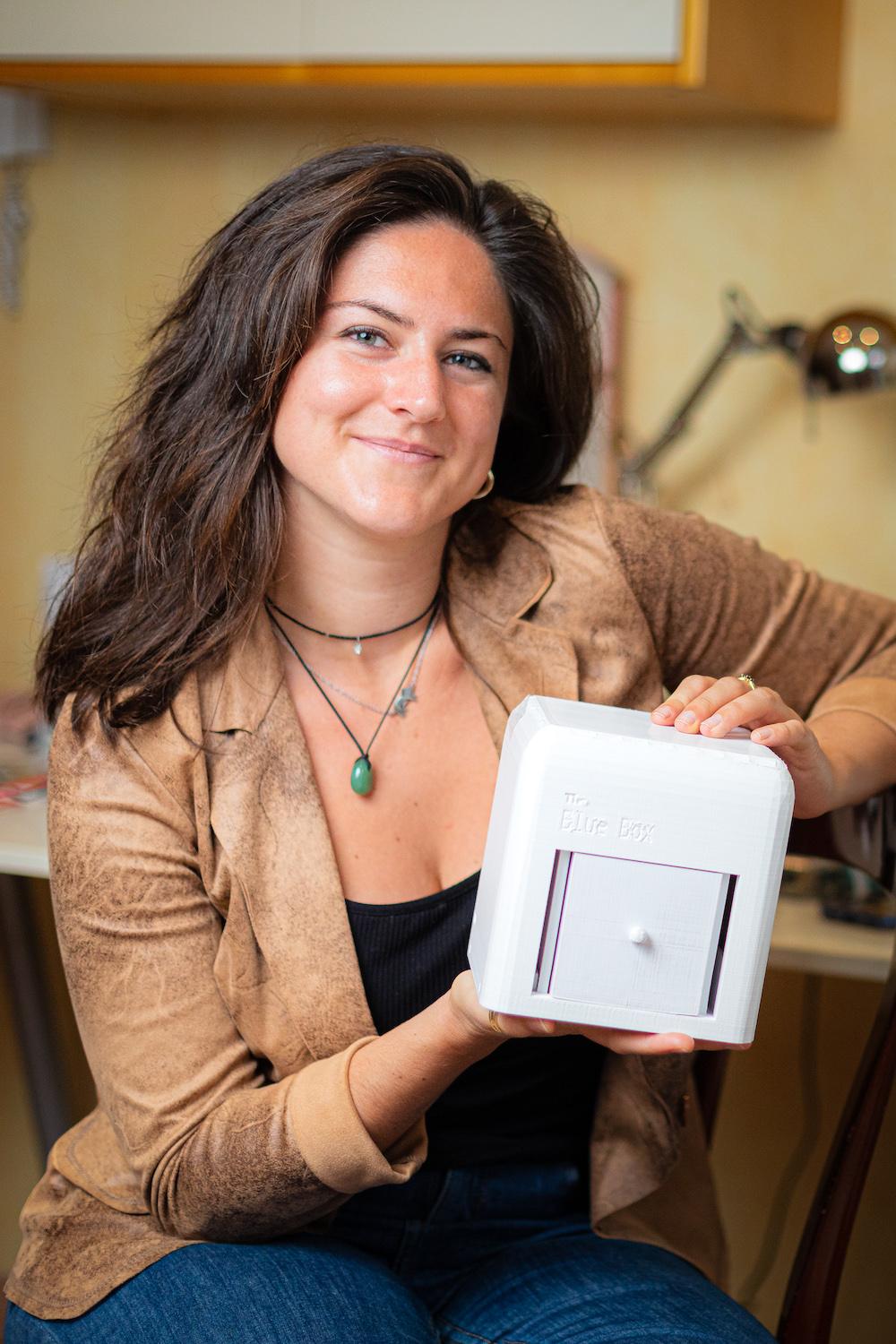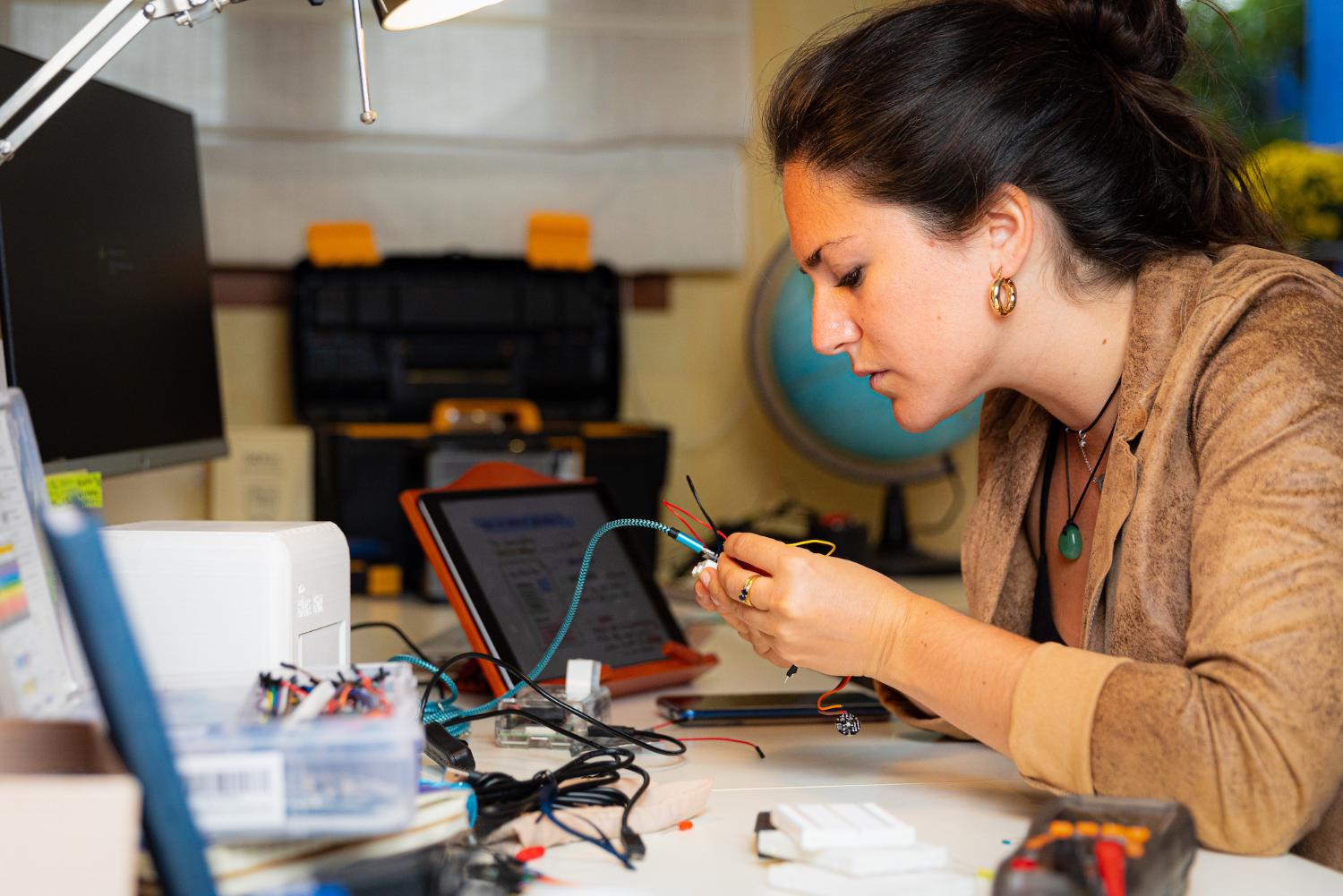Interview: Judit Giró Benet, James Dyson Award International Winner 2020
Winning the International 2020 James Dyson Award, 23-year-old Judit Giró Benet is the mind behind The Blue Box - a new way to detect breast cancer, at-home, using just a urine sample. After finding out she won the title, we caught up with her to hear about her journey so far, the inspiration behind her project and what lies ahead.
19 November 2020
Congratulations on winning the International James Dyson Award. What was it like the moment you found out?
Well, it was a lot of information to take in! Having Sir James Dyson calling me to tell me the news was definitely a turning point for The Blue Box project. Firstly, because when you start a company, you need advice and money and secondly, because I really admire everything that he has achieved. Starting from just an idea and ending up with a huge company is an example for everyone else in the world. So, having him call me and saying that he was selecting me as the Global Winner was the feeling that he was trusting in this project. He is an inspiration and the news gave me a lot of strength, too!
What did you study and what have you done to get to this point?
I studied Biomedical Engineering in Barcelona and I had the idea for The Blue Box then. After that, I went to the University of California Irvine to do a Masters in Embedded Cyber-Physical Systems. I chose this Masters with The Blue Box in mind. I felt like I had the idea and the inspiration but I was lacking some kind of technical knowledge. So, I went to California to learn about artificial intelligence and how to design hardware that works in harmony with software. Here, I was able to produce my third prototype and I met my business partner, Billy.
What inspired you to become an engineer?
When I was in school, I really liked maths. It wasn't like a subject to me, because I really enjoyed doing it! Also, I've always been very amazed by the human body and how it is so perfect. I was curious about how it all fits together so well. I thought for a little while that I wanted to study medicine but then, I thought, "No way. I'm going to miss maths too much!"
One day, when I was 15, I went with one of my teachers to an exhibition on future career pathways and I heard someone giving a speech on biomedical engineering. Hearing that was very, very close to falling in love for me and I knew I had to study this! When I had to put down my options for university, all three were for biomedical engineering. It was the only thing I wanted.
Who are the people that have really inspired you? Are there any engineers that you look up to or are inspired by?
My dad is also an engineer and it has given me a very different perspective. In biomedical engineering, you learn how to do very, very small things, that if you make it 1mm too big, you're going to kill someone. So, you have to be very, very specific. But my dad is an electronic engineer, so he does huge, big things, so his point of view on engineering is so different from the one I was taught, but I have learnt a lot from him.
Also, there was a professor during my studies who taught us how to observe biology and design models from it. It was literally translating biology into numbers and that was so beautiful because you could understand everything. Like, if you are able to write everything down in an equation, you can solve all the problems. They were both clearly an inspiration to me.
-
How did you discover the James Dyson Award and what made you apply?
One friend sent me a link to it and I started investigating. I really loved the idea behind it. I think that the James Dyson Award is something that the world really needs because there are so many great ideas that don't turn into reality because there's no one else behind it. It's such a prestigious award that you never imagine yourself winning this kind of thing. Of course, I already believed in my project but as I was writing the application, I was like, "yes, it works. Look! I'm writing it down." But of course, you never imagine yourself winning such a thing.
What does The Blue Box do and how does it work?
Well, it's a box, it's blue and it gives you a diagnosis of whether you should see a doctor, because you might have breast cancer. The reason I wanted to build that is because I discovered that there are some dogs that can detect ill health in humans. If the dog barks, they know the human has cancer. And the dogs, they are never wrong - they are always right, which shows how amazing nature is.
So, I thought, if the dog is able to do that, why wouldn't my Arduino microprocessor be able to? I read a lot of articles trying to find out what the compounds are that make the dogs bark. I started collecting a lot of sensors and I put them all together. Then, we make a hypothesis on which sensors do we need so that we are detecting the right compounds.
In the end, some of them were right about some of them, so we were actually able to detect breast cancer. I had a lot of help from my professors but in the end, there are sensors that detect certain biochemical compounds in urine and they give out the signal. However, this signal is so weak that humans would not be able to detect it, so we need artificial intelligence to help us.
What inspired you to create The Blue Box?
Seeing these dogs that are able to do that was a clear inspiration but I also did a bachelor thesis on something similar to The Blue Box. There are other people that already tried to detect cancer with sensors, so I emulated what other people described. I asked a lot of my professors to be my mentor but in the end, there was one professor called Antonio Pardo who said "Yeah! Why not?! Let's try it!" He was such an optimist. A huge part of the project is thanks to him, because he believed in it since the beginning.
-

-

-
Now that you have won the award, what are the next steps for you?
There are three things. One is to protect the intellectual property so that we can ensure a future market. When we have that, we will be able to start getting more investors, because they don't want to come until everything is patented, of course. We will also form the company and refine the structure. From there, we will start clinical trials - we will have to pass FDA approvals and EMA approvals so that we can deliver it and end up in everyone's home.
How will the James Dyson Award help you on your journey?
It will help in two ways. One is that if you say you have won the James Dyson Award, people will listen to you. Because someone has already trusted us, so that's a huge help. Also, the prize money will let us patent the product. And if we are patented, we are able to pitch to investors. So instead of taking two years, it will take half a year. It's a huge difference.
Where do you see The Blue Box in five or ten years’ time?
In five years' time, I would like to be an established company. But more importantly, the biggest impact of The Blue Box is not the machine itself, but the community that we want to create around it. We want to present The Blue Box not only as a biomedical device but as a change in the way we fight breast cancer. If you're part of this community, we want you to feel like you are actively taking a role in the fight against breast cancer because you are preventing yourself from getting cancer, but you are also, helping to train the algorithm. Every time you get screened, you are helping the women that come after you to get an even better diagnosis. So, we want to have a product in the market but we also want to have a community of women who really care about their health and that really care about each other.

.jpg?$responsive$)



